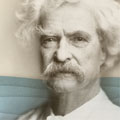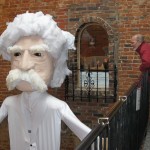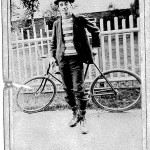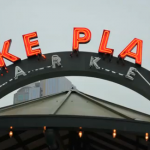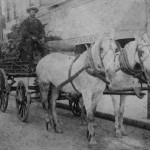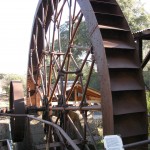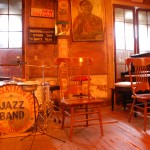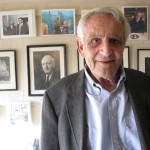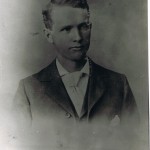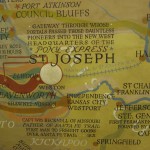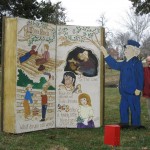
Mark Twain might be amused at his pairing in Muscatine with Norman Baker on a Mark Twain Overlook historic site sign
If Sam Clemens (Mark Twain) were to return to Muscatine, Iowa, where he helped brother Orion put out the Journal in the early 1850s, he would find reminders of three fascinating economies in the Mississippi River town’s history.
The Laura Musser Mansion, now part of the Muscatine Arts Center, recalls the mid-1860s when the Musser and other families grew wealthy by harvesting nearby forests and making Muscatine into a significant lumber city.
The H. J. Heinz plant, the first Heinz plant built outside Pittsburgh, was completed in 1892 at a cost of $4,000. Today’s plant employs about 400 workers and still takes advantage of the local soil, ideal for growing tomatoes, watermelons and other fruits and vegetables.
The Button Factory Woodfire Grille, housed in an 1890 riverfront building, represents an industry launched by John Frederick Boepple in 1891 when he discovered that the Mississippi’s mussel shells could be cut into mother-of-pearl buttons. By 1905 nearly half of Muscatine’s workforce produced 37% of the globe’s buttons, earning the city the title of “Pearl Button Capital of the World.”
But Twain would be most intrigued perhaps by how Muscatine chooses to celebrate him. At the site of an early Muscatine Journal building—now the MVP Lounge, which advertises $10 All-U-Can-Drink beer nights–there’s the usual Twain-was-here plaque.
At the Mark Twain Overlook for viewing the Mississippi, however, a historic site sign pairs Twain with Norman G. Baker (1882-1958), a self-proclaimed doctor who operated a local “hospital” and high-wattage radio station KTNT (“Know the Naked Truth”), claimed a cure for cancer and served time at Leavenworth Federal Penitentiary for mail fraud.
Twain might also smile at his quote that Muscatine chooses to celebrate on that sign—about the community having world-best sunsets—not his statement in an 1855 travel piece he wrote from St. Louis for the Muscatine Journal that local sunsets were second best, behind a Chinese sunset in a St. Louis painting.
Twain might laugh, too, at a two-story-tall Twain puppet in the lobby of Pearl Plaza, a downtown shopping center. The giant Twain was made by dozens of volunteers from chicken wire, cotton batting, sheep wool, plastic tubing and recycled paper from the Muscatine Journal, where Twain had his early travel writings—eight letters from Philadelphia, Washington, D.C., and St. Louis—published in 1853-55.

This two-story Mark Twain puppet fills the lobby of Pearl Plaza, a downtown Muscatine shopping arcade
The letters remind me of the worst and best of Twain and of our 14,063-mile van trip around the United States. Twain’s Muscatine Journal letters represent his ignorant, racist youth. The letters disparage Jews, Native Americans, Catholics and abolitionist U.S. senators; they celebrate three senators—Henry Clay, John C. Calhoun and Daniel Webster—who helped pass the Fugitive Slave Act.
Though Twain never accepted Native Americans, his faith in slavery as “right, righteous, sacred” and his nativist criticism of immigrants changed dramatically. He evolved over decades into a progressive writer on the right side of history, into the “Lincoln of our literature.”
During our three-month Twain trip around America we heard about the worst of America. In Idaho, a state that has attracted white Californians running away from diversity, Margie Laughlin described conversations with whites who wanted a president who looked like them and wished President Obama dead.
But the Muscatine area, said Rusty Schrader, the 42-year-old news editor of the Muscatine Journal, sees diversity “more as an opportunity than a challenge.” Muscatine (in the 2000 census, 20% Hispanic) and neighboring small towns with chicken and turkey processing plants, Columbus Junction (39% Hispanic) and West Liberty (40% Hispanic), have embraced diversity, Schrader said.
That, however, has not freed these communities from a problem faced today by much of America. “Poverty has become a big issue,” said Mary L. Wildermuth, 60, executive director of the Muscatine History and Industry Center.
“The community is changing,’ Wildermuth explained. “Over 50% of the students in our schools today are receiving free or reduced lunch.” She worries that many families will not be able to earn enough to provide their children with the post-secondary education required for employment in the highly technical Muscatine manufacturing workplace.
Loren
